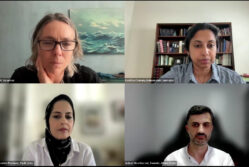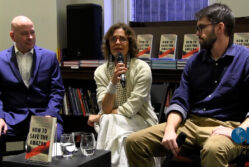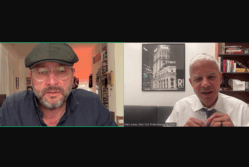Event Coverage Highlight

Panelists Say Murders of Journalists Are Simply a ‘Reality’ in Russia

Left to right: Judith Matloff, Elena Kostyuchenko, Misha Friedman and Zach Fannin. Photo: Chad Bouchard.
By Chad Bouchard
On sept. 20, several OPC members attended a performance of the play “Intractable Woman, A Theatrical Memo on Anna Politkovskaya,” which covered the interrogation, trial and assassination of the Russian journalist and human rights activist. Politkovskaya reported extensively on the Second Chechen War for the independent daily Novaya Gazeta and was killed in her Moscow apartment building in 2006.
Following the performance, a panel of journalists discussed Politkovskaya’s legacy, as well as their own experiences covering conflict and corruption in Russia and elsewhere in the region.
The moderator was OPC member Judith Matloff, an author and journalism professor at Columbia University who has specialized in writing about conflict. Matloff, who was based in Moscow in the late 90s, said the play brought back memories of the country’s quick slide into authoritarianism under Vladimir Putin, who came to power at the very end of 1999.
“In the late 90s there was still a very robust critical media, and you could report fairly transparently with some exceptions like the war in Chechnya,” she said. “And that all stopped under Putin. The crackdown on independent media and voices began immediately, and one by one journalists lost their jobs, faced death threats, they were beaten, and like Anna, murdered.”
Matloff said that to date, 17 journalists have been assassinated under the Putin regime, and 60 journalists attacked just since 2006.
Elena Kostyuchenko, a special correspondent for Anna’s paper, Novaya Gazeta, said the number of journalists killed in Russia is closer to 200, though the numbers are difficult to track.
“Murders of journalists is part of Russian reality,” she said, adding that the newspaper has shown through tenacity that the assassination of journalists is not an effective way to quash journalism. “Despite very tough conditions for journalism in Russia, many young and aspiring journalists still come to Novaya Gazeta and want to do good work. And they all read Anna’s articles” for inspiration, she added.
Matloff asked if there were stories or topics that the paper will not cover because of safety risks.
“No, we try avoid self-censorship, because it’s the main method of censorship in Russia,” Kostyuchenko said. “It’s not as though Putin is calling editors and telling them ‘don’t write about that.’ The worst thing about Russian journalism is people try to guess what authorities don’t like, and this is really insane.”
She said reporters take some security measures, and try to make the job of assassination harder, but “if somebody orders your murder, there is no real way to protect yourself. You can only change the price of murder. If you have body guards around you, it’s going to be a bit more expensive, but it’s not going to prevent the murder.”
Kostyuchenko’s paper is the last independent newspaper in Russia, and is co-owned among staff members. She added that she once survived poisoning by criminal gangs connected to authorities, so is now more careful about her food and drink. Kostyuchenko is the 2018 Paul Klebnikov Russian Civil Society Fellow at Columbia’s Harriman Institute.
Chillingly, less than a month after the discussion, a funeral wreath and a severed goat’s head were sent to the Novaya Gazeta Moscow office with written threats against reporter Denis Korotkov, who has reported on Russia’s military operations in Syria, among other stories.
One month ago, three Russian journalists were investigating Russian mercenaries in the Central African Republic, and died from what appeared to be hits by Russian authorities. Their names were Orkhan Dzhemal, Aleksandr Rastorguev and Kirill Radchenko.
Misha Friedman, a Russia-born photographer based in New York who has worked extensively in Russia and Ukraine, said photographers are predominantly freelancers, so they are subject to different risks than staffers. He said risks are also increased because photographers have to get physically close to their subjects and “report consequences” in stories. He said while risks in Russia are serious, many places in the region are even more dangerous.
“There are risks working in Russia in general, but in the broader context, even the sorts of risks compared to those that exist in the region, Russia is about average. There are countries like Ukraine, if you don’t count the front lines, that are infinitely easier to report in. There are places like Belarus in Central Asia, where it’s a lot harder in terms of surveillance.”
Friedman called for editors to be more considerate about risks in the field, and to avoid pressuring freelancers to push safety limits.
Zach Fannin, a freelance journalist who won several awards for “Inside Putin’s Russia,” a PBS NewsHour series, recounted how he and other members of his team were arrested while reporting on Russians joining ISIS in Dagestan.
“All [the police] wanted us to do was delete the footage. But luckily, they left us in the police car alone, and I took one of the two disks out of the camera, gave it to Roman [Stepanovych], our local producer, who hid it somewhere, and then convinced the police by saying ‘look, I didn’t even press record yet, this is an empty disk and there is no footage.”
It was one of two times the team was arrested during their work. The second time Fannin was detained for three hours and ultimately had to delete the footage he’d taken.
Fannin co-produced the series with OPC member Nick Schifrin in collaboration with the Pulitzer Center on Crisis Reporting. The post-show panel was part of Play Company’s Idea Lab series.
Click the window below to watch a playlist of clips from the program.



